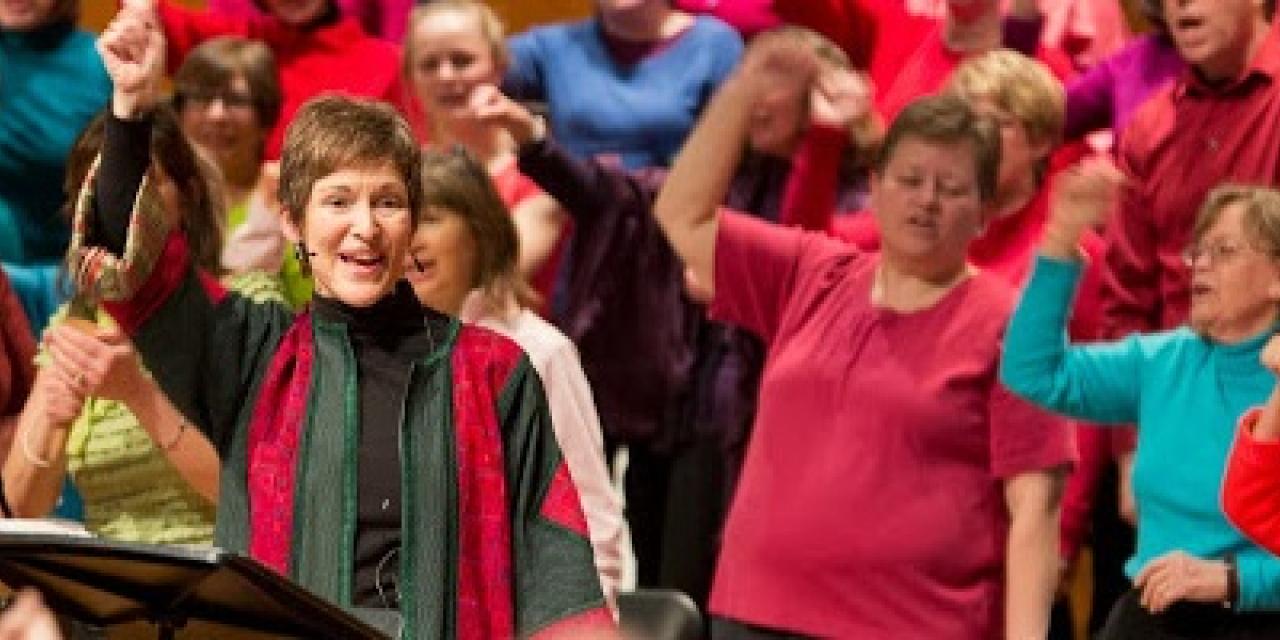A tenor began: “Who will set us free?” The gathered people echoed him, “Who will set us free?” The plaintive call-and-response Filipino song continued: “Who else can set us free? Jesus. Jesus. We’re waiting. We’re waiting for you. You said you’d be coming. Don’t let our hope be futile.” The haunting melody soared on the word futile, like a child calling for a parent.
The setting was a 2014 Calvin Symposium on Worship vespers service in Grand Rapids, Michigan. It was led by Debbie Lou Ludolph and Inshallah, the global song ensemble from Waterloo Lutheran Seminary in Waterloo, Ontario. Their “Singing Our Prayers with the Global Community” vespers was one of several symposium offerings designed to help congregations pray in music with and for the worldwide church.
You can listen to “Who Will Set Us Free” from 24:15 to 27:07 on the link above. Imagine singing this prayer while seeing projected images of natural disaster survivors, people in war zones or child laborers. The song would work well during a Freedom Sunday or Human Trafficking Awareness Day worship service.
The global music vespers service included simple songs from around the world, all listed with their sources in this document. Ludolph and Inshallah also led a symposium workshop, “Singing Songs from the Global South in a North American Church Context.” Listening to the workshop will answer some of your global music questions about instrumentation and introducing foreign languages or movement in mostly Euro-North American churches.
Interspersing a sung refrain with spoken prayers is an easy way to involve all worshipers in interceding for the worldwide church. People at the “Singing Our Prayers with the Global Community” vespers experienced this with the refrain from “For God Alone My Soul Awaits in Silence” (17:53 to 24:03). During Anne Zaki’s prayer at the Exodus 20 service (01:01:12 to 01:10:55), Julia Smith led worshipers in intermittent repetitions of the refrain from “Salaam/Peace.”
Sometimes a song is the best way to confess together the things that keep our churches from being Christ’s visible presence in the world. The news is full of these wounds in Christ’s body—Catholics and Protestant violence in Northern Ireland…Christians from Dinka and Nuer tribes killing each other in South Sudan…lingering racism among Christians around the world…mistrust between Christians of different income and educational levels or opposing views on politics, the environment, gender or sexuality.
Karen Campbell, convener of the worship panel for the Presbyterian Church in Ireland, wrote a hymn that works well as a confession or paired with a spoken corporate confession. This hymn, based on Isaiah 6, includes the line, “We lay our church before you, its glory and its shame.” She and workshop participants sang it in her workshop on global prayer (song starts at 24:58).
The Lift Up Your Hearts (LUYH) hymnal includes dozens of prayers (see pages 60-62) along with worship suggestions of how to use them with songs. “There will eventually be prayers to go with every psalm, hymn and spiritual song in LUYH,” Cornelius “Neal” Plantinga Jr. said in his symposium workshop “Complementary Prayers: Prayers to Accompany the Psalms, Hymns, and Spiritual Songs of the New Hymnal Lift Up Your Hearts.” (People pronounce the acronym LUYH like the final syllables of hallelujah or alleluia.)
Plantinga has been writing prayers to go with LUYH selections that don’t already have them. Worship leaders are free to borrow his prayers whole or in part or to adapt them.
He said that lament takes faith, and, in God’s providence, “intercession may do the ones-interceded-for some good, but are sure to do the interceder some good.” He suggested pairing “Come, Sing to God with All Your Heart” with a prayer for vindication that begins, “O God, make this a bad day for tyrants. Displace them with righteous rulers.” Along with singing “O When Will We See Justice Done,” he offered a prayer of lament that includes the line, “How long will legislators bicker instead of passing solid laws?”

